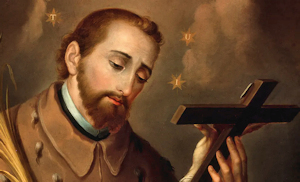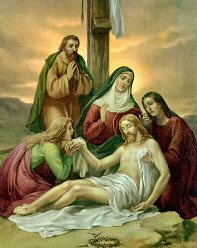Lent: March 20th
Saturday of the Fourth Week of Lent
Other Commemorations: St. John Nepomucene, Priest and Martyr (RM)
» Enjoy our Liturgical Seasons series of e-books!
The theme of life and light has colored the Liturgy of this week. Before leading the catechumens into the Mystery of Christ's Passion and Death, the Church presents Christ to them once more as the Light of the world who has the power to open man's eyes to his Light. He will veil it for a while during his Passion but it will burst forth in full splendor again on Easter morning.
According to the Roman Martyrology, today is the feast of St. Photina, the Samaritan woman at the well.
Meditation
We must forgive our neighbor always. This fraternal charity is the source of strength among the members of the Mystical Body: "If two of you shall consent upon earth concerning anything whatsoever they shall ask, it shall be done to them by my Father." This charity should animate us in giving fraternal correction, which should always be free from all vanity, self-love and desire to humiliate and defame.
The Church dispenses Christ's forgiveness through the power of the keys: "whatsoever you shall loose upon earth shall be loosed also in heaven." Christ's pardon of us is limitless. Just as the small quantity of oil, increasing miraculously at the word of Elias, enabled the poor widow to pay all her debts, so the infinite merits of Christ enable us to expiate all our sins.
Love of God and of neighbor imposes on us constant self-denial and self-mastery. Only love working through mortification will enable us to ascend the "holy hill" and dwell in "God's tabernacle." — The Cathedral Daily Missal by Right Rev. Msgr. Rudolph G. Bandas
Highlights and Things to Do:
- Discuss the idea of forgiveness with your children — emphasizing with today's Gospel that Christ's forgiveness is limitless to those who humbly repent of their offenses against Him. Ask them ways in which they practice this virtue every day, with their sisters and brothers, with their parents, and with their friends.
- Throughout this fourth week of Lent, often the time when children begin to lose focus or weary of this penitential season, give them something tangible to work on, such as a Lenten Scrapbook, an ongoing activity that will engage their minds and stretch their creativity in putting their faith into pictures.
St. John Nepomucene (Nepomuk)
 Born at Nepomuk, Bohemia, 1340; died in Prague, March 20, 1393; canonized in 1729. Saint John used the name of his native town for his surname instead of his family name of Woelflein or Welflin. He studied at the University of Prague, was ordained, and became a canon. In time, he became vicar general of Archbishop John of Genzenstein at Prague and according to tradition incurred the enmity of dissolute King Wenceslaus IV when he refused to reveal what Queen Sophie, Wenceslaus’ second wife, had told him in confession. Of a retiring disposition, Father John repeatedly refused bishoprics which were offered to him.
Born at Nepomuk, Bohemia, 1340; died in Prague, March 20, 1393; canonized in 1729. Saint John used the name of his native town for his surname instead of his family name of Woelflein or Welflin. He studied at the University of Prague, was ordained, and became a canon. In time, he became vicar general of Archbishop John of Genzenstein at Prague and according to tradition incurred the enmity of dissolute King Wenceslaus IV when he refused to reveal what Queen Sophie, Wenceslaus’ second wife, had told him in confession. Of a retiring disposition, Father John repeatedly refused bishoprics which were offered to him.
In 1393 (or 1383 according to some), he became involved in a dispute between Wenceslaus and the archbishop when the king sought to convert a Benedictine abbey into a cathedral for a new diocese he proposed to create for a favorite when the aged abbot died. The archbishop and John thwarted him by approving the election of a new abbot immediately on the death of the old abbot. At a meeting with John and other clerics, Wenceslaus flew into a rage, tortured them so that John was seriously injured, and then had him murdered and thrown into the Moldau River at Prague (Attwater, Benedictines, Delaney).
Saint John is portrayed in art as an Augustinian canon with a fur almuce and a bridge near him. He may hold his finger to his lips and have seven stars around his head, or wear a padlock on his lips (in Austria and Bohemia). John, patron of confessors and bridges, is venerated in Austria and Spain (Roeder).
—by Katherine Rabenstein, Saints of the Day
Patronage: against calumnies; against floods; against indiscretions; against slander; bridge builders; bridges; canons; confessors; for discretion; for good confession; mariners, sailors, boatmen, watermen; running water; silence; spiritual directors; Bohemia; Czech Republic; archdiocese of Prague, Czech Republic; Slovakia; Venice, Italy
Symbols and Representation: halo with five stars; cross; bridge; angel indicating silence by a finger over the lips; priest's biretta
Highlights and Things to Do:
- Read more about St. John Nepomucene:
- Read about the location of Saint John of Nepomuk's Martyrdom.
- The Statue of St. John of Nepomuk on Charles Bridge in Prague.
- See Christian Iconnography for depictions of St. John.
- Learn more about Prague and the Czech Republic and St. Vitus Cathedral, supposedly started by St. Wenceslas in the 10th century as a small chapel to house relics of St. Vitus and were in the 14th century St. John Nepomucene was buried after being executed for refusing to violate the seal of the confessional.
- Read about the Infant Jesus of Prague and pray the chaplet.
- Bake a loaf of bread for dinner and serve Pilsner beer in honor of St. Wenceslas. See also Catholic Cuisine for other ideas.






